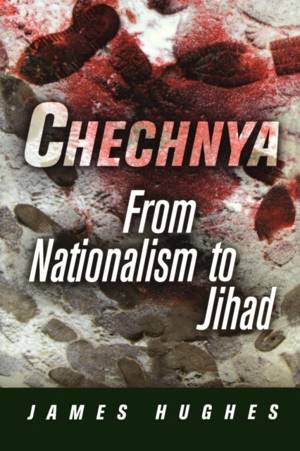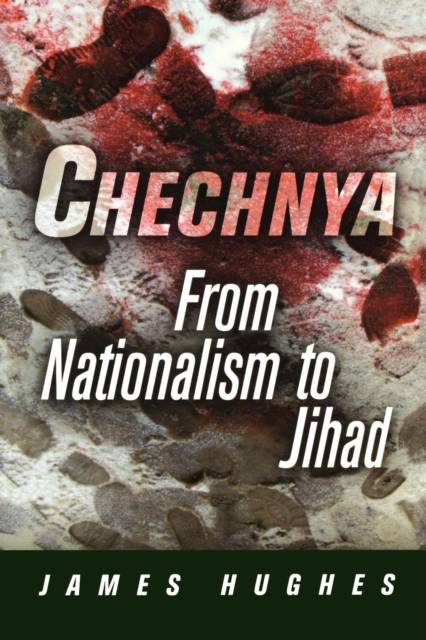
- Retrait gratuit dans votre magasin Club
- 7.000.000 titres dans notre catalogue
- Payer en toute sécurité
- Toujours un magasin près de chez vous
- Retrait gratuit dans votre magasin Club
- 7.000.0000 titres dans notre catalogue
- Payer en toute sécurité
- Toujours un magasin près de chez vous
Description
Chechnya From Nationalism to Jihad James Hughes "James Hughes has produced the most comprehensive, thoroughly documented, and up-to-date study of the Chechen conflict available. This sophisticated and subtle analysis places Chechnya in the context of broader debates about nationalism and ethnic politics, theories of empire and secession, and the propensity of new democracies to go to war."--Matthew Evangelista, Cornell University "Hughes offers a new way of thinking about ethnopolitical conflict by examining conflict dynamics as part of the causation chain in a conflict."--History: Reviews of New Books "Does the book have value for the military historian? Absolutely."--Journal of Military History "an excellent starting point for anyone looking for insight into how the radical Sunni Salafi movement both evolved and commandeered the struggle in Chechnya, which could also serve as an example as to how Al-Qaeda could hijack other nationalist struggles in the future."--International Affairs "An exemplary case study. . . . Throughout, insights into the consequences of the collapse of the Soviet Union, the reconstitution of a federated Russia, and the leadership of Vladimir Putin abound. . . . Highly recommended."--Choice The sheer scale and brutality of the hostilities between Russia and Chechnya stand out as an exception in the mostly peaceful breakup of the Soviet Union. Chechnya: From Nationalism to Jihad provides a fascinating analysis of the transformation of secular nationalist resistance in a nominally Islamic society into a struggle that is its antithesis, jihad. Hughes locates Chechen nationalism within the wider movement for national self-determination that followed the collapse of the Soviet empire. When negotiations failed in the early 1990s, political violence was instrumentalized to consolidate opposing nationalist visions of state-building in Russia and Chechnya. The resistance in Chechnya also occurred in a regional context where Russian hegemony over the Caucasus, especially the resources of the Caspian basin, was in retreat, and in an international context of rising Islamic radicalism. Alongside Bosnia, Kashmir, and other conflicts, Chechnya became embedded in Osama Bin Laden's repertoire of jihadist rhetoric against the "West." It was not simply Russia's destruction of a nationalist option for Chechnya, or "Wahabbist" infiltration from without, that created the political space for Islamism. Rather, we must look also at how the conflict was fought. The lack of proportionality and discrimination in the use of violence, particularly by Russia, accelerated and intensified the Islamic radicalization and thereby transformed the nature of the conflict. James Hughes is Professor of Comparative Politics at the London School of Economics and Political Science. National and Ethnic Conflict in the 21st Century 2007 296 pages 6 x 9 5 illus. ISBN 978-0-8122-2030-8 Paper $26.50s £17.50 ISBN 978-0-8122-0231-1 Ebook $26.5s £17.50 World Rights Political Science Short copy: The conflict in Chechnya involves many of the most contentious issues in contemporary international politics. By providing us with a persuasive and challenging study, Hughes sets out the indispensable lessons for other conflicts involving the volatile combination of insurgency and counterinsurgency, most notably the wars in Iraq and Afghanistan.
Spécifications
Parties prenantes
- Auteur(s) :
- Editeur:
Contenu
- Nombre de pages :
- 296
- Langue:
- Anglais
- Collection :
Caractéristiques
- EAN:
- 9780812220308
- Date de parution :
- 11-06-08
- Format:
- Livre broché
- Format numérique:
- Trade paperback (VS)
- Dimensions :
- 152 mm x 227 mm
- Poids :
- 444 g

Les avis
Nous publions uniquement les avis qui respectent les conditions requises. Consultez nos conditions pour les avis.






